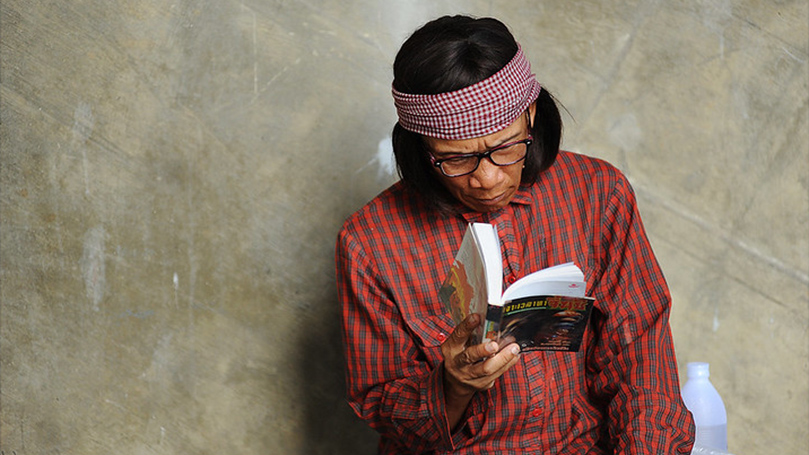
Editor’s note: We present 10 excellent books for your consideration, in no particular order. Happy reading!
1. Washington Bullets: A History of the CIA, Coups, and Assassinations, by Vijay Prashad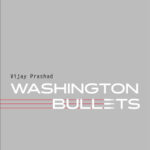
In Washington Bullets, Vijay Prashad writes about the history of CIA- and IMF-backed coups from the onset of the Cold War to the present in Guatemala, Venezuela, Congo, Indonesia, Brazil, and elsewhere. He also discusses the U.S.-backed military coup in Bolivia, which ousted the Movement Toward Socialism (MAS) and indigenous leader Evo Morales from power in 2019.
2. Can’t Pay, Won’t Pay: The Case for Economic Disobedience and Debt Abolition, by The Debt Collective
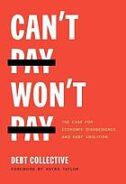
Can’t Pay, Won’t Pay is the first book by the militant debtor organization, the Debt Collective. It provides a strategy for debtors in the financialized U.S. economy to strike the debts they owe to predatory lenders. The Debt Collective’s organizers come out of the Occupy Wall Street movement and have to date cancelled up to a billion dollars in debt, owing to the militant strategizing that took place during the student debt strike of the “Corinthian 15.”
3. Reinventing the Welfare State: Digital Platforms and Public Policies, by Ursula Huws
 Far from fulfilling its original aims, Ursula Huws suggests, the post-World War II welfare state has been captured by the ruling class and made into tool for the upward redistribution of resources, the downward redistribution of risk, and the erosion of solidarity between different sections of the working class. Rather than looking to salvage the institutions of the twentieth-century model, Huws argues, we should be looking at how the goals of the welfare state might be met in the new realities of the twenty-first, through fundamental reforms like a universal basic income and universal workers’ rights. Building on her earlier work on neoliberalism and technological change, she pays special attention to the role that new digital platforms could play in that project, if turned from private profit to public good. Though her work focuses on Great Britain, the challenges, contradictions, and opportunities she identifies have a much broader scope. Essential reading for anyone working toward a democratic solution to the latest capitalist crisis.
Far from fulfilling its original aims, Ursula Huws suggests, the post-World War II welfare state has been captured by the ruling class and made into tool for the upward redistribution of resources, the downward redistribution of risk, and the erosion of solidarity between different sections of the working class. Rather than looking to salvage the institutions of the twentieth-century model, Huws argues, we should be looking at how the goals of the welfare state might be met in the new realities of the twenty-first, through fundamental reforms like a universal basic income and universal workers’ rights. Building on her earlier work on neoliberalism and technological change, she pays special attention to the role that new digital platforms could play in that project, if turned from private profit to public good. Though her work focuses on Great Britain, the challenges, contradictions, and opportunities she identifies have a much broader scope. Essential reading for anyone working toward a democratic solution to the latest capitalist crisis.
4. The Dawning of the Apocalypse: The Roots of Slavery, White Supremacy, Settler Colonialism, and Capitalism in the Long Sixteenth Century, by Gerald Horne
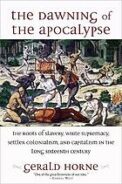
Gerald Horne retells the history of slavery from its beginnings in North America, going back to the 1520s, when Spain brought enslaved Africans to what would become South Carolina. He uses the “long sixteenth century,” from 1492 until the arrival of English settlers in Virginia in 1607, to debunk the “creation myth” of the United States. During the long century, the enslaved Africans joined forces with Indigenous peoples to resist Spanish colonialism, weakening Spain’s position in the “New World” and opening the door to English settler colonialism. At the same time, the concept of whiteness “morphed into ‘white supremacy,’” allowing England to enlist “not only religious minorities but also various nationalities throughout Europe, thus forging a muscular bloc . . . to confront rambunctious Indigenes and Africans.”
5. The Tragedy of American Science: From Truman to Trump, by Clifford D. Conner
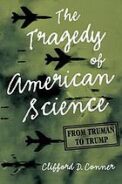
The Tragedy of American Science discusses how science and technology serve the military-industrial complex to find “new and more efficient ways to kill people.” Science has been corrupted by America’s never-ending drive for military superiority and the profits associated with it. “That those trillions of dollars in resources and scientific talent are not devoted to solving the problems of poverty, disease, and environmental destruction is one of the greatest tragedies of our times.” Conner argues that a “science-for-human-needs system” is still within our grasp.
6. The Brutish Museums: The Benin Bronzes, Colonial Violence and Cultural Restitution, by Dan Hicks
 The author advocates for the return of stolen art and artifacts looted from countries violently conquered and plundered by the English and other European countries, but also makes the case that such violence is perpetuated today by the artifacts being in museum collections. Hicks characterizes the series of attacks in Africa by the colonial powers as World War Zero, carried out during the late Victorian and Edwardian period. The looting of art and sacred objects was not only theft but Marxist accumulation that created a wealthy museum system. Hicks creates a framework for talking about the history of looting and theft, and how Western Europe created white narratives of superiority in the dawning of mechanized warfare and colonial capitalism. This book will realign the reader’s perceptions about art, science, museums, and culture.
The author advocates for the return of stolen art and artifacts looted from countries violently conquered and plundered by the English and other European countries, but also makes the case that such violence is perpetuated today by the artifacts being in museum collections. Hicks characterizes the series of attacks in Africa by the colonial powers as World War Zero, carried out during the late Victorian and Edwardian period. The looting of art and sacred objects was not only theft but Marxist accumulation that created a wealthy museum system. Hicks creates a framework for talking about the history of looting and theft, and how Western Europe created white narratives of superiority in the dawning of mechanized warfare and colonial capitalism. This book will realign the reader’s perceptions about art, science, museums, and culture.
7. The Jakarta Method: Washington’s Anticommunist Crusade and the Mass Murder Program That Shaped Our World, by Vincent Bevins
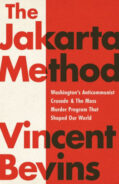
The Jakarta Method argues that the CIA-backed “brutal extermination of unarmed leftists was a fundamental part” of how Washington won the Cold War. The title of the book comes from the little-known, little-studied “extermination” of “one million innocent” Indonesian civilians in 1965, all in an attempt to destroy the Indonesian Communist Party, which at that time was the largest Communist Party in the world outside China and the Soviet Union. This “method” was then repeated countless times throughout the developing world, resulting in tens of millions of deaths. Bevins approvingly cites historian John Coatsworth, who estimates that “the number of victims of U.S.-backed violence in Latin America ‘vastly exceeded’ the number of people killed in the Soviet Union and the Eastern Bloc over the same period of time.” Importantly, this “method” was used even in countries where the Soviet Union or China played no discernible political role, resulting in the creation of a “world of regimes that see any social reform as a threat.” Violent anti-communism, as Bevins argues, continues to shape our world, and unfortunately has regained some of its potency among those on the right.
8. Faith in the Masses
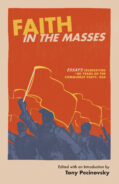
Faith in the Masses is a collection of 12 essays by historians and activist-scholars on various aspects of the 100-year history of the Communist Party, USA. The essays demonstrate the CPUSA’s century-long commitment to equality, workers’ rights, peace, and socialism. They highlight the struggle for African American equality, Black liberation, and women’s rights, and place athletic, cultural, and literary activities well within the scope of CPUSA work. This book asserts that the CPUSA played a leading role in the social and economic justice struggles of the 20th century.
Included in this collection are three essays that challenge the narrative dominant within traditional academic circles that the CPUSA became a marginal political force post-1956. Faith in the Masses includes a discussion of Communist involvement in the 1960s and 1970s youth and student upsurge, peace, civil rights, and the movement for environmental sustainability.
— International Publishers
9. Five Days, Five Nights, by Manuel Tiago (Álvaro Cunhal), translated by Eric A. Gordon
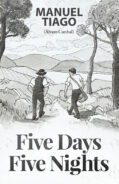
Although published in 1975, Five Days, Five Nights has not been translated into English until now. Cunhal, leader of the Portuguese Communist Party, wrote this work during his 11-year imprisonment, which lasted until 1960 when he made a daring escape. He tells the fictional story of 19-year-old André, who attempts to escape oppression in Portugal by emigrating to Spain. He enlists the help of a criminal, and together they “cross the rough border terrain, passing through villages and encountering a few peasants along their way.” Although a work of fiction, Five Days is a reminder “not only of the sacrifices made by fascism’s resisters, but of the loss of creativity and intelligence that Portugal suffered due to fascism’s erosion of talented, hardworking citizens.”
10. The Fight for the Soul of the Democratic Party: The Enduring Legacy of Henry Wallace’s Antifascist, Antiracist Politics, by John Nichols
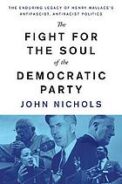
The Fight for the Soul of the Democratic Party discusses the different class forces within the Democratic Party’s history from the presidency of FDR to today. The ouster of Henry Wallace from the vice presidency for the reactionary Harry Truman led the Democrats down the path of supporting austerity and abandoning its popular front coalition and New Deal programs.
- Tags:
- books
- Year in Review
Related Articles
- Women’s History Month Book Talk: Lessons from Revolutionary Organizing
- Erasing History: A useful, if liberal intro to fascist revisionism
- Trailer Park America highlights the crimes of capitalist housing
- From our readers: the best of 2023
- Come celebrate International Publishers’ centennial anniversary!


 Join Now
Join Now